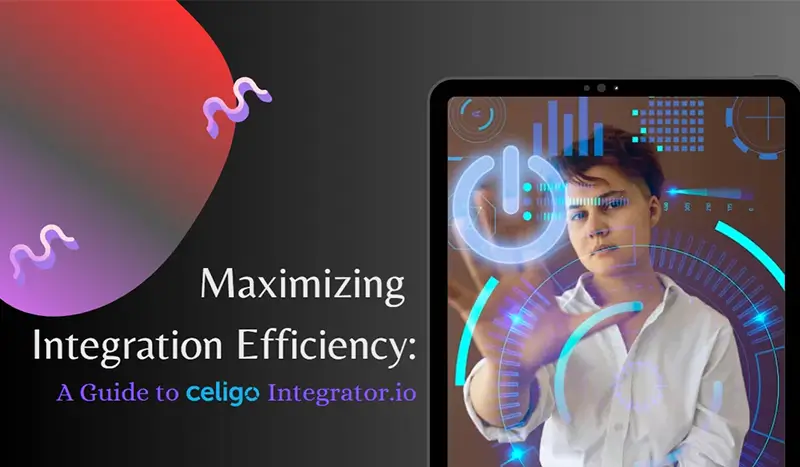Understanding Celigo Integrator.io
At the heart of modern business operations, Celigo Integrator.io stands as a versatile integration platform meticulously crafted to untangle the complexities of linking varied applications, data origins, and operational workflows. This robust solution empowers enterprises with the ability to expunge the need for manual data input, curbing the potential for errors, and fine-tuning their processes through the establishment of seamless connections between different software systems. Whether the landscape involves cloud-centric applications, in-house systems, or a harmonious blend of both, Integrator.io provides a unified hub where integration and workflow automation coalesce with effortless finesse.
Getting Started with Celigo Integrator.io
Celigo Integrator.io is a cloud-based integration platform that connects different software applications and automates their interactions. It helps organizations streamline processes, reduce manual work, and ensure accurate data flow between systems. With features like automation, pre-built connectors, and data mapping, it simplifies integration tasks and improves overall operational efficiency. Integrator.io serves as a central hub for harmonizing data and workflows across various applications, enhancing collaboration and productivity.
• Assessment: Begin by assessing your organization’s integration needs. Identify the applications, systems, and processes that could benefit from automation and data synchronization.
• Selection: Choose the pre-built integrations that align with your requirements. Integrator.io’s extensive library includes connectors for CRM, ERP, e-commerce, marketing, and more.
• Configuration: Customize the chosen integrations to match your unique workflows. Utilize the visual interface to map data fields, set up triggers, and define data transformation rules.
• Testing: Thoroughly test your integrations before deploying them in a production environment. This step ensures that data flows accurately and processes run smoothly.
• Deployment: Once testing is successful, deploy your integrations. Monitor their performance and make any necessary adjustments based on real-world usage.
• Optimization: Regularly review and optimize your integrations as your business evolves. This might involve adding new applications, adjusting data mappings, or enhancing automation logic.
Celigo EDI
Celigo EDI refers to the Electronic Data Interchange (EDI) capabilities provided by the integration platform Celigo. EDI is a standardized method used by businesses to exchange electronic documents and data in a structured format. Celigo’s EDI solution enables companies to automate and streamline their trading partner communications and data exchange processes.
Features of Celigo EDI
• Automation: Celigo EDI automates the exchange of business documents, reducing the need for manual data entry and minimizing errors.
• Trading Partner Connectivity: The solution connects businesses with their trading partners, ensuring seamless communication and collaboration.
• Document Mapping: Celigo EDI includes tools to map data fields between different systems, ensuring that information is correctly interpreted and translated.
• Compliance: The solution helps businesses adhere to EDI standards and industry-specific regulations, ensuring smooth interactions with partners.
• Validation: Celigo EDI validates data to ensure accuracy and consistency before sending or receiving documents.
Celigo API
Celigo API refers to the Application Programming Interface (API) capabilities provided by the Celigo platform. An API is a set of defined rules and protocols that allow different software applications to communicate and interact with each other. Celigo’s API capabilities enable businesses to connect, integrate, and automate their applications and data to streamline workflows and improve efficiency.
Key Aspects of Celigo API
• Custom Integrations: Celigo API enables businesses to build tailored integrations between their applications, addressing their unique needs and requirements.
• Automation: Businesses can automate tasks and processes by leveraging Celigo’s API to trigger actions in response to specific events or data changes.
• Data Exchange: Celigo API facilitates the secure exchange of data between different systems, ensuring accuracy and consistency.
• Workflow Enhancement: By integrating different applications and systems, Celigo API helps optimize workflows and reduce manual work.
• Real-time Interaction: The API allows applications to interact in real-time, enabling up-to-date data synchronization and responsiveness.
• Scalability: Celigo API supports the growth of businesses by accommodating increased data volume and more complex integration scenarios.
Key Features of Celigo Connectors
• Pre-Built Integration: Celigo Connectors come with predefined integration workflows, data mappings, and transformation rules that are tailored to specific applications or use cases.
• Ease of Use: Businesses can quickly set up integrations without needing extensive technical expertise or coding skills. This accelerates the integration process and reduces implementation time.
• Supported Applications: Celigo offers a wide range of connectors for popular applications such as Salesforce, NetSuite, Shopify, Amazon, and more. These connectors cover a diverse set of use cases, from CRM to e-commerce to financial management.
• Data Consistency: Celigo Connectors ensure that data is accurately mapped and transferred between applications, reducing the risk of errors and inconsistencies.
• Real-time and Batch Integration: Depending on the specific connector, Celigo provides options for both real-time and batch integration, allowing businesses to choose the approach that best suits their needs.
• Scalability: As businesses grow and evolve, Celigo Connectors can scale seamlessly to accommodate increased data volumes and more complex integration scenarios.
Celigo Data Loader
Celigo Data Loader is a tool provided by the Celigo platform that facilitates the bulk import and export of data between various applications. It simplifies the process of moving large amounts of data between systems, ensuring accuracy and efficiency. The Data Loader is particularly useful for businesses that need to migrate data, update records, or synchronize information across different software applications.
Key Features of Celigo Data Loader
• Bulk Data Management: Celigo Data Loader allows businesses to handle significant volumes of data in a single operation, saving time and reducing manual effort.
• Data Migration: Businesses can smoothly transition data from one application to another, ensuring a seamless switch without data loss or disruption.
• Import and Export: The tool enables the importing of data into an application as well as exporting data from an application to another system.
• Data Transformation: Celigo Data Loader offers data transformation capabilities, enabling businesses to map and transform data fields to match the structure and format required by the target application.
• Automated Processes: The tool allows businesses to set up automated data transfer processes, ensuring consistent and regular data synchronization.
• Error Handling: Celigo Data Loader includes error handling mechanisms to identify and manage data inconsistencies or issues during the data transfer process.
• Data Validation: Before data is loaded into the target application, Celigo Data Loader can perform validation checks to ensure data accuracy and completeness.
Conclusion
Celigo Integrator.io has become a beacon of efficiency for modern businesses seeking to streamline their operations, enhance collaboration, and stay ahead of the competition. By offering an intuitive interface, pre-built integrations, customization options, real-time data sync, and scalability, it equips organizations with the tools they need to succeed in today’s interconnected world.
Incorporating Celigo Integrator.io into your business framework through OdiTek’s robust integration services opens the door to a new era of operational excellence. Seamlessly merging the power of Celigo’s intuitive interface, ready-made integrations, and real-time data synchronization with OdiTek’s expertise, your organization can redefine efficiency and collaboration. Your journey to elevated efficiency and productivity begins with OdiTek and Celigo Integrator.io.
Contact us today to embrace the power of integration, and unlock new realms of success for your business with OdiTek!







